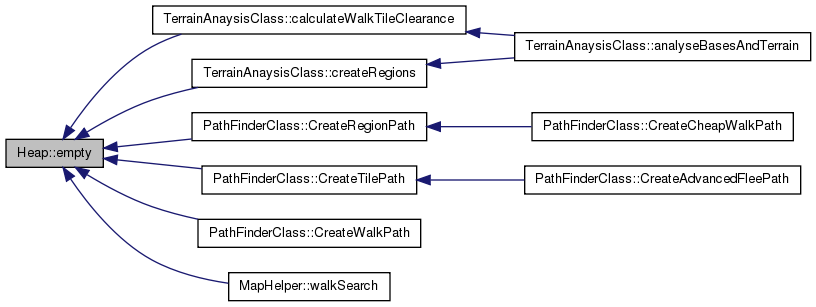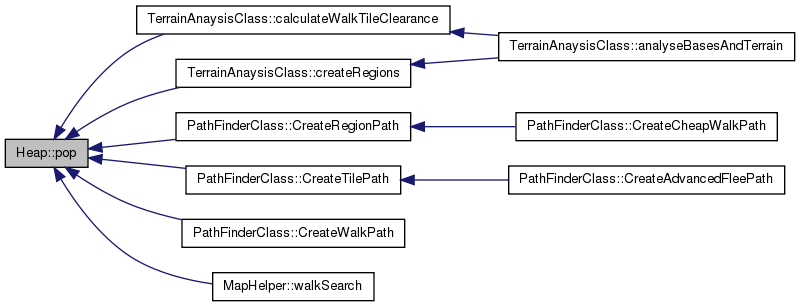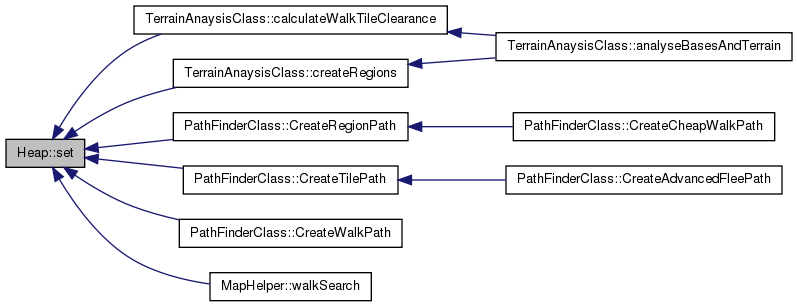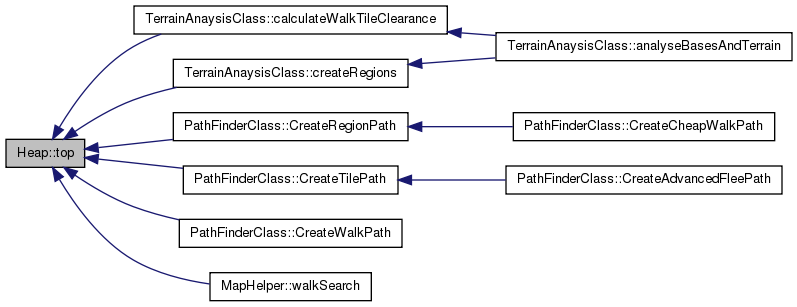|
BWAPI
|
|
BWAPI
|
#include <Heap.h>
Public Member Functions | |
| Heap (bool isMinHeap=false) | |
| void | push (const std::pair< Key, Val > &val) |
| void | pop () |
| const std::pair< Key, Val > & | top () const |
| bool | empty () const |
| bool | set (const Key &key, const Val &val) |
| const Val & | get (const Key &key) const |
| bool | contains (const Key &key) const |
| int | size () const |
| void | clear () |
| bool | erase (const Key &key) |
Private Member Functions | |
| int | percolate_up (int index) |
| int | percolate_down (int index) |
Private Attributes | |
| std::vector< std::pair< Key, Val > > | mData |
| std::map< Key, int > | mMapping |
| bool | mIsMinHeap |
Definition at line 9 of file Heap.h.
: mIsMinHeap(isMinHeap) {}
Definition at line 91 of file Heap.h.
References Heap< Key, Val >::mData, and Heap< Key, Val >::mMapping.
Referenced by Heap< Key, Val >::erase().

Definition at line 80 of file Heap.h.
References Heap< Key, Val >::mMapping.
Definition at line 46 of file Heap.h.
References Heap< Key, Val >::mData.
Referenced by TerrainAnaysisClass::calculateWalkTileClearance(), PathFinderClass::CreateRegionPath(), TerrainAnaysisClass::createRegions(), PathFinderClass::CreateTilePath(), PathFinderClass::CreateWalkPath(), and MapHelper::walkSearch().
{
return mData.empty();
}

Definition at line 97 of file Heap.h.
References Heap< Key, Val >::clear(), Heap< Key, Val >::mData, Heap< Key, Val >::mMapping, and Heap< Key, Val >::percolate_down().
Referenced by TerrainAnaysisClass::createRegions().
{
std::map<Key, int>::iterator it = mMapping.find(key);
if(it == mMapping.end())
return false;
if(mData.size() == 1)
clear();
else
{
int index = it->second;
mData[index] = mData.back();
mData.pop_back();
mMapping.erase(it);
percolate_down(index);
}
return true;
}


Definition at line 73 of file Heap.h.
References Heap< Key, Val >::mData, and Heap< Key, Val >::mMapping.
| int Heap< Key, Val >::percolate_down | ( | int | index | ) | [inline, private] |
Definition at line 142 of file Heap.h.
References Heap< Key, Val >::mData, Heap< Key, Val >::mIsMinHeap, and Heap< Key, Val >::mMapping.
Referenced by Heap< Key, Val >::erase(), Heap< Key, Val >::pop(), and Heap< Key, Val >::set().
{
if(index < 0 || index >= (int)mData.size())
return -1;
unsigned int lchild = index * 2 + 1;
unsigned int rchild = index * 2 + 2;
unsigned int mchild;
int m = mIsMinHeap ? -1 : 1;
while((mData.size() > lchild && m * mData[index].second < m * mData[lchild].second) || (mData.size() > rchild && m * mData[index].second < m * mData[rchild].second))
{
mchild = lchild;
if(mData.size() > rchild && m * mData[rchild].second > m * mData[lchild].second)
mchild = rchild;
std::swap(mData[mchild], mData[index]);
mMapping.find(mData[index].first)->second = index;
index = mchild;
lchild = index * 2 + 1;
rchild = index * 2 + 2;
}
mMapping.find(mData[index].first)->second = index;
return index;
}

| int Heap< Key, Val >::percolate_up | ( | int | index | ) | [inline, private] |
Definition at line 122 of file Heap.h.
References Heap< Key, Val >::mData, Heap< Key, Val >::mIsMinHeap, and Heap< Key, Val >::mMapping.
Referenced by Heap< Key, Val >::push(), and Heap< Key, Val >::set().
{
if(index < 0 || index >= (int)mData.size())
return -1;
unsigned int parent = (index - 1) / 2;
int m = mIsMinHeap ? -1 : 1;
while(index > 0 && m * mData[parent].second < m * mData[index].second)
{
std::swap(mData[parent], mData[index]);
mMapping.find(mData[index].first)->second = index;
index = parent;
parent = (index - 1) / 2;
}
mMapping.find(mData[index].first)->second = index;
return index;
}

Definition at line 21 of file Heap.h.
References Heap< Key, Val >::mData, Heap< Key, Val >::mMapping, and Heap< Key, Val >::percolate_down().
Referenced by TerrainAnaysisClass::calculateWalkTileClearance(), PathFinderClass::CreateRegionPath(), TerrainAnaysisClass::createRegions(), PathFinderClass::CreateTilePath(), PathFinderClass::CreateWalkPath(), and MapHelper::walkSearch().
{
if(mData.empty())
return;
mMapping.erase(mData.front().first);
mData.front() = mData.back();
mData.pop_back();
if(mData.empty())
return;
std::map<Key, int>::iterator it = mMapping.find(mData.front().first);
if(it != mMapping.end())
{
it->second = 0;
percolate_down(0);
}
}


| void Heap< Key, Val >::push | ( | const std::pair< Key, Val > & | val | ) | [inline] |
Definition at line 11 of file Heap.h.
References Heap< Key, Val >::mData, Heap< Key, Val >::mMapping, and Heap< Key, Val >::percolate_up().
Referenced by PathFinderClass::CreateRegionPath(), PathFinderClass::CreateTilePath(), PathFinderClass::CreateWalkPath(), Heap< Key, Val >::set(), and MapHelper::walkSearch().
{
int index = mData.size();
if(mMapping.insert(std::make_pair(val.first, index)).second)
{
mData.push_back(val);
percolate_up(index);
}
}


| bool Heap< Key, Val >::set | ( | const Key & | key, |
| const Val & | val | ||
| ) | [inline] |
Definition at line 51 of file Heap.h.
References Heap< Key, Val >::mData, Heap< Key, Val >::mMapping, Heap< Key, Val >::percolate_down(), Heap< Key, Val >::percolate_up(), and Heap< Key, Val >::push().
Referenced by TerrainAnaysisClass::calculateWalkTileClearance(), PathFinderClass::CreateRegionPath(), TerrainAnaysisClass::createRegions(), PathFinderClass::CreateTilePath(), PathFinderClass::CreateWalkPath(), and MapHelper::walkSearch().
{
std::map<Key, int>::iterator it = mMapping.find(key);
if(it == mMapping.end())
{
push(std::make_pair(key, val));
return true;
}
int index = it->second;
mData[index].second = val;
index = percolate_up(index);
if(index >= 0 && index < (int)mData.size())
{
percolate_down(index);
return true;
}
return false;
}


Definition at line 41 of file Heap.h.
References Heap< Key, Val >::mData.
Referenced by TerrainAnaysisClass::calculateWalkTileClearance(), PathFinderClass::CreateRegionPath(), TerrainAnaysisClass::createRegions(), PathFinderClass::CreateTilePath(), PathFinderClass::CreateWalkPath(), and MapHelper::walkSearch().
{
return mData.front();
}

Definition at line 118 of file Heap.h.
Referenced by Heap< Key, Val >::clear(), Heap< Key, Val >::empty(), Heap< Key, Val >::erase(), Heap< Key, Val >::get(), Heap< Key, Val >::percolate_down(), Heap< Key, Val >::percolate_up(), Heap< Key, Val >::pop(), Heap< Key, Val >::push(), Heap< Key, Val >::set(), Heap< Key, Val >::size(), and Heap< Key, Val >::top().
bool Heap< Key, Val >::mIsMinHeap [private] |
Definition at line 120 of file Heap.h.
Referenced by Heap< Key, Val >::percolate_down(), and Heap< Key, Val >::percolate_up().
Definition at line 119 of file Heap.h.
Referenced by Heap< Key, Val >::clear(), Heap< Key, Val >::contains(), Heap< Key, Val >::erase(), Heap< Key, Val >::get(), Heap< Key, Val >::percolate_down(), Heap< Key, Val >::percolate_up(), Heap< Key, Val >::pop(), Heap< Key, Val >::push(), and Heap< Key, Val >::set().
 1.7.6.1
1.7.6.1